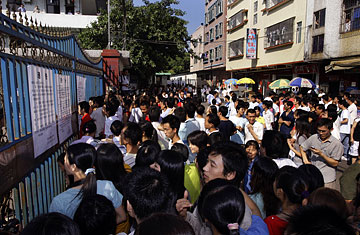
Hundreds of workers gather outside a large toy factory in Zhang Mu Tou in Guangdong province, China, on Oct. 17
When China's President Hu Jintao made his first official visit to Washington in April of 2006, he encountered a string of diplomatic snafus that culminated in enduring several minutes of screaming from a protester admitted into the media stand. Still, U.S. officials say he and President George W. Bush developed a genuine personal rapport. At one point, Bush asked his counterpart which of the numerous challenges China faced was the most serious — which one kept Hu awake at night worrying. "Unemployment," Hu reportedly answered without hesitating.
These days, Hu must be suffering from serious insomnia. When that meeting in Washington took place, China's economy was still expanding at a double-digit rate, creating enough jobs every year that many of the 20 million new job seekers who entered the market found some sort of gainful employment. Now GDP growth has dipped to around 9% and is expected to decline further as the worldwide financial crisis transmogrifies into a global recession. Already, scores of Chinese factories producing consumer goods like toys and plastics goods have shuttered in the southern industrial powerhouse of Guangdong, and thousands of unemployed workers have made their displeasure known with rowdy demonstrations last month.
It's a situation that is only going to get much worse in the next few months, as the number of unemployed balloons. According to estimates by the Dongguan City Association of Enterprises with Foreign Investment, 9,000 of the 45,000 factories in the cities of Guangzhou, Dongguan, and Shenzhen — the heart of China's industrial south — are expected to close before the Chinese New Year in late January. That could mean up to 2.7 million workers facing unemployment, the association said. And they called that number "conservative."
Finding jobs for millions of unemployed is "the biggest challenge [China's] leadership faces" says David Dollar, head of the World Bank's China office in Beijing. The current crisis has greatly accelerated a process that was already underway as China's economy has been shedding low-level factory jobs to transition to manufacturing higher value-added products and jobs in the service industry. "In a way, the crisis could work out well for China. It has the potential to help in rebalancing the economy away from production" to the creation of more jobs in the service sector, says Dollar. If GDP growth slows further to 8%, the government still can hit its job creation targets, but the speed with which the adjustment happens will be critical, he says. "We're going to learn just how well the capital and labor markets work in China. The concern is if the adjustment is very quick, it could be difficult."
There have already been indications of what exactly "difficult" might mean. On October 18, some three thousand laid-off migrant workers demonstrated outside the gates of a shuttered toy factory owned by Hong Kong company Smart Union Group (Holdings). The workers were demanding the payment of over $3 million in back wages. With the factory managers apparently having fled to Hong Kong, the Dongguan city government was eventually forced to announce that it would guarantee their payment.
That day, the protest passed peacefully. But the government's overriding concern is that such protests could become violent and even spread. China, by its own admission, suffers tens of thousands of what the government describes as "mass incidents," or protests involving large numbers of demonstrators, and the majority take place in the countryside. Should they begin to occur in the cities, "we would be witnessing the most severe challenge the Communist leadership has faced in many, many years," says Beijing based scholar Russell Leigh Moses. "Stability has been taken for granted by outsiders, but cadres are well aware of how dependent their power is on economic growth. This is a going to be a very real test of the government's capacity."
